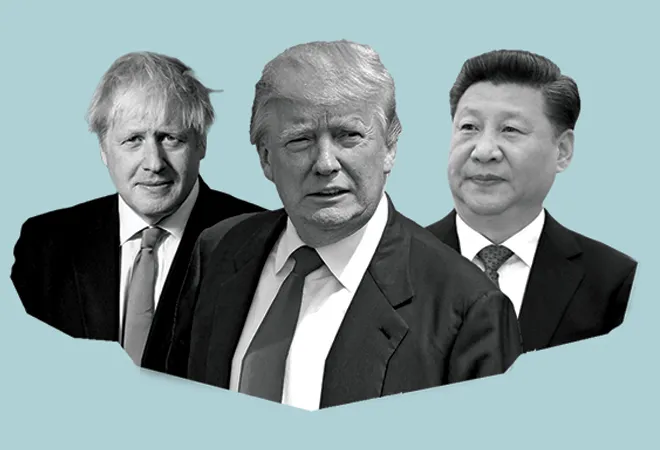-
CENTRES
Progammes & Centres
Location
Although London’s actions on Hong Kong and Huawei suggest a renewed US-UK alignment against China, it also exacerbates Washington’s asymmetric pull over the ‘special relationship’.

Early this year, reports emerged of a phone call between US President Donald Trump and UK Prime Minster Boris Johnson, on the latter’s decision to permit Huawei in the UK’s next-generation telecommunications network. Trump reportedly “expressed his views in livid terms” over Johnson ignoring the US’ global campaign against Chinese telecommunications equipment. According to some reports, Trump even “hung up” on Johnson — which was deemed to be one of the reasons behind the postponement of the British prime minister’s visit to Washington.
The much-discussed “apoplectic” phone call was one amongst many instances which indicate that, beyond a supposed alignment of personalities, the US-UK ‘special relationship’ — as once characterised by Winston Churchill — stands marred with divergences on the policy level. Under Trump, ties have frayed over the UK continuing to support the Iran Nuclear Deal, Trump cutting US contributions to NATO ahead of the alliance’s 70th anniversary celebration in London, the Johnson government’s proposed digital services tax (against which the US has threatened to impose tariffs on British cars), the Trump administration’s refusal to extradite an American diplomat’s wife charged with killing a British teenager, and Trump occasionally weighing-in on the UK’s ongoing Brexit negotiations with the European Union (EU).
"The much-discussed “apoplectic” phone call was one amongst many instances which indicate that, beyond a supposed alignment of personalities, the US-UK ‘special relationship’ — as once characterised by Winston Churchill — stands marred with divergences on the policy level."
However recently, the Johnson government’s actions on China have borne an upturn in US-UK ties.
The UK’s initial position on Huawei was to permit its inclusion in the UK’s 5G infrastructure -- despite US Secretary of State Mike Pompeo deeming it as betraying Margaret Thatcher’s legacy of standing up to regimes that violate the “sovereignty of nations through corruption or coercion.” In a sign of the UK hedging between China and the US, it dismissed concerns over risks posed by integrating Huawei equipment, but limited Huawei’s inclusion to “no more than 35 per cent in the periphery of the network.”
However, following American sanctions that prevents Huawei from using technology or software of US origin, the UK’s National Cyber Security Centre reviewed the security risks of Huawei technology and advised a change in policy. The UK then went on to ban Huawei from its infrastructure entirely, and has even cracked down on operators such as BT and Vodafone by giving them until 2027 to remove all Huawei equipment from their networks.
The US was quick to claim credit with Trump saying, “We convinced many countries, many countries — and I did this myself for the most part.” And Pompeo even hailed it as an instance of united “push back” against China.
"The UK has not only criticised the National Security Law in Hong Kong, but also its implementation."
The Johnson government has also taken a firm stance on China’s implementation of the infamous National Security Law in Hong Kong — which gives China unprecedented administrative power and curtails the independence of the Hong Kong judiciary from the Chinese justice system. The UK has not only criticised the law but also its implementation. In alleging it to have contravened the 1985 Sino-British Joint Declaration on Hong Kong in several ways, the UK has extended a unique set of immigration rules for those Hong Kong nationals who hold British National Overseas i.e. BN(O) visas, to provide them a path to citizenship in the UK. Johnson termed this as “one of the largest changes in the British visa system in history.”
Moreover, in escalating its response by suspending its extradition treaty with Hong Kong, and extending the arms embargo that the UK has applied to China since 1989 to now even include Hong Kong, the UK has complemented the Trump administration’s decision to end preferential economic treatment for Hong Kong.
Apart from the brewing global anti-China sentiment — trigged by the coronavirus pandemic, the UK’s actions seem to have also stemmed from recognising the solidifying US bipartisanship against China. Over the past two months alone, the Democratic-led US House of Representatives and the Republican-led US Senate have complemented the Trump administration’s policy on China. For instance, by passing the Uyghur Human Rights Policy Act of 2020 to unanimously call for sanctions against Chinese officials responsible for the internment of minorities in Xinjiang, passing the Hong Kong Autonomy Act which mandates sanctions against Chinese officials and entities that assisted Beijing’s imposition of its security law in Hong Kong, and introducing a bipartisan set of legislations (Defending America’s 5G Future Act) to anchor the Trump administration’s actions on Huawei in US law. However, apart from greater alignment with the US, the UK’s actions on China will complicate the balance of the ‘special relationship’ by raising the importance of a US-UK trade deal.
"On face value, given the Trump administration’s own focus on upending multilateral trading arrangements and opting for renewed “fair and reciprocal” bilateral trade deals instead, a deal with the UK — with which the US also enjoys a goods and services trade surplus of over $18 billion — seems obvious."
Despite their differences over the severity of Brexit, the Johnson government — much like its predecessor May government, has emphasised the criticality of negotiating bilateral trading arrangements with non-EU countries in order to underscore a post-Brexit “Global Britain.” Beyond looking to score such deals to reassure that the UK would “emerge bigger and better from the divorce” with the EU, a successfully negotiated deal with the US — which is the largest destination for UK exports after the EU, or China — the UK’s third-biggest export market, would also strengthen London’s hand in its negotiations with Brussels.
On face value, given the Trump administration’s own focus on upending multilateral trading arrangements and opting for renewed “fair and reciprocal” bilateral trade deals instead, a deal with the UK — with which the US also enjoys a goods and services trade surplus of over $18 billion — seems obvious. However, in holding out for more favourable terms on contentions such as unfettered access for US drugs and medical devices, the Trump administration has been more than willing to let negotiations prolong as it waits to “see what concessions and regulatory changes emerge” from UK-EU negotiations.
Now, in view of the Johnson government’s actions, there have been indications of China retaliating by choosing to “slow down or suspend” talks over a China-UK trade agreement. Apart from compounding the UK’s drift away from the EU, the possible stalling of UK-China trade talks will only increase the urgency of a prospective US-UK trade deal. This in-turn would exacerbate the power differential between London and Washington, with the latter in a greater position to “dictate” terms over contentions like the UK continuing the EU ban on import of chlorinated chicken from the US.
"Apart from compounding the UK’s drift away from the EU, the possible stalling of UK-China trade talks will only increase the urgency of a prospective US-UK trade deal."
Moreover, even if US-UK negotiations prolong beyond the upcoming November elections — probably leading into Trump’s defeat at the hands of Democratic nominee and former Vice President Joe Biden, London’s worries won’t go away.
Reportedly, former British diplomats have cautioned against a Biden presidency’s bid to reverse Trump’s derision of multilateralism — which could have the US return to dealing with the EU as its primary interlocutor in the region. With respect to the US-UK deal, there are also concerns over Biden picking-up on Barack Obama’s 2016 stance of the UK finding itself “at the back of the queue” for a US-UK trade deal if it were to actualise Brexit. In addition, Democratic leaders in the US Congress — which wields the power to put into force any trade deals negotiated by the executive branch, have already warned of blocking a US-UK deal if Brexit negotiations with the EU threaten the “seamless border between the Irish Republic and Northern Ireland.”
Hence, far from resolving the many divergences that plague US-UK ties, London’s recent actions on China will only enhance Washington’s hold over the ‘special relationship.’
Abhimanini Sawhney is a Research Intern at ORF.
The views expressed above belong to the author(s). ORF research and analyses now available on Telegram! Click here to access our curated content — blogs, longforms and interviews.

Kashish Parpiani is Senior Manager (Chairman’s Office), Reliance Industries Limited (RIL). He is a former Fellow, ORF, Mumbai. ...
Read More +